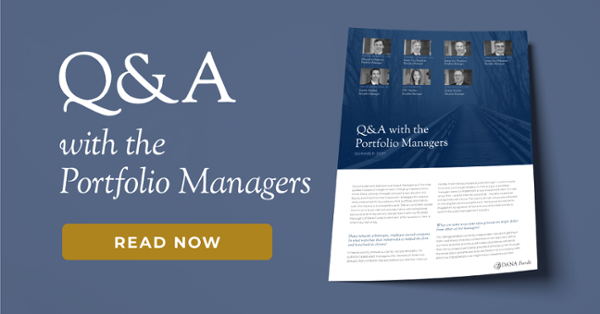For Markets, What Comes After Election Results and Vaccine?
In the past two weeks, investors got a lot more clarity on two of the largest clouds hanging over the market: the U.S. election and the coronavirus.
We now know who the next president is, and have a better idea (Georgia’s Senate election notwithstanding) of what the balance of power will look like in Washington D.C. And news that Pfizer’s coronavirus vaccine has shown a high success rate offers hope that we may be on the path toward addressing the coronavirus pandemic and normalizing the economy, even if current infection spread is alarming.
In this brief Q&A, Dana portfolio managers Joseph Veranth and David Weinstein reflect on what the election and vaccine could mean for markets going forward
Q. Going forward which will have a bigger impact on markets – the election outcome or the vaccine?
Joseph Veranth: The vaccine. We’ve always felt the trajectory of the market was going to follow the prospects for reopening, and getting the economy running.
The election went largely as expected, and a Democratic president and Republican-controlled Senate mean either party’s ability to affect the type of big change that moves markets will be relatively limited.
Q. Beyond the main headline that the Pfizer vaccine’s preliminary results showed it was 90% effective, what else was encouraging?
David Weinstein: The vaccine met the highest expectations we could hope for. We also expect safety data on the vaccine to be positive. The trial never had to pause due to safety concerns and that’s a really good sign that final data on safety should be positive.
With distribution planning in progress for several months, we also feel that will be handled well once the vaccine is approved. A comment from Dr. Anthony Fauci that he would be willing to take the vaccine is also encouraging. Endorsements from respected health officials eliminate concern about the vaccine and increase the likelihood people will get on board with taking it.
Q. What does the vaccine news mean for markets?
David Weinstein: You already saw an early move where “reopening” stocks, which are typically value oriented, cyclical stocks, did quite well. We think we’ll continue to see that trend into 2021. It comes after many “stay at home” stocks, which are essentially technology businesses and growth stocks, have outperformed significantly in 2020.
We would expect some of the cyclical value stocks to continue to benefit as we get more encouraging news about a vaccine. We acknowledge the virus is spreading right now, and those numbers are alarming – but as we get more positive news from Pfizer or other vaccine manufacturers, the market will look further ahead.
Q. Getting back to the election, at a high level, what do the results mean for markets?
Joseph Veranth: With the caveat that we need to see the results of the upcoming Georgia Senate race, it looks like we’ll have what I like to call a “balanced” government, between a Democratic president, a narrowly controlled Republican Senate and a narrowly controlled Democratic House. You’re getting a check on the progressive agenda, which, all things being equal, is probably good for markets. With Trump out, there will also be less trade tension with China, which markets should view favorably.
Q. What should investors watch to see how the two parties will work together?
David Weinstein: The next big item will be a stimulus package. The market will react to whether it gets done, and how big it will be.
Q. What does a Biden presidency mean for specific stocks or pockets of the market?
David Weinstein: Stocks that have been hurt by trade tensions should fare better as those tensions ratchet down. We like the potential for semiconductor companies, which have their own set of secular tailwinds and also benefit from reduced trade tensions.
When Biden comes into office, I would also expect him to use executive order to accomplish a few things around climate change, such as rejoining the Paris Climate Agreement. Any stocks tied to green policy – think companies in the electric vehicle supply chain – should experience a tailwind.
Q.What do election results mean for ESG investing?
David Weinstein: ESG interest has already grown substantially in recent years, but the election should be a further benefit for ESG investing. There had been attempts by Trump administration to use tools or appointments to limit the ability of pensions to integrate ESG into portfolios. That’s going away. New appointments to agencies such as the SEC will likely pressure businesses to disclose more about environmental issues, which is also good for ESG.
Q. For an advisor talking to his or her client, what are the biggest, high-level takeaways from the news of the past couple weeks?
Joseph Veranth: If you’ve been on the sidelines with equities, get invested. If you’re not on the sidelines, stay the course. With the election and promise of a vaccine we’ve cleared, or started to clear, two clouds hanging over markets. We could still get more negative news on the coronavirus, but a vaccine moves us toward the end goal of reopening.
Also, expect a broader market driving performance going forward. Growth stocks, and more specifically, mega-cap tech stocks, have been large outperformers in 2020. If you’re overexposed to those stocks, it’s time to diversify.



